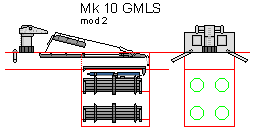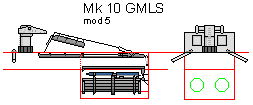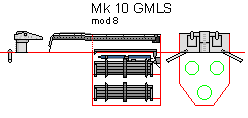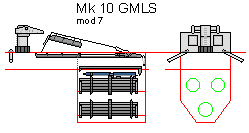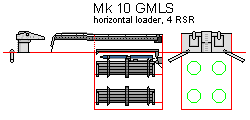Difference between revisions of "Mk 10 Terrier GMLS"
Acelanceloet (talk | contribs) |
Acelanceloet (talk | contribs) |
||
| Line 38: | Line 38: | ||
Red lines shows the bulkheads and decks around the installation. The drawing has the belowdeck installation drawn in, which requires covering for use on a finished Shipbucket drawing. The Terrier missile underneath the part drawing is oversized for detail, the missiles in the part are correctly sized. For clarity they are shown in blue (training round) colour. | Red lines shows the bulkheads and decks around the installation. The drawing has the belowdeck installation drawn in, which requires covering for use on a finished Shipbucket drawing. The Terrier missile underneath the part drawing is oversized for detail, the missiles in the part are correctly sized. For clarity they are shown in blue (training round) colour. | ||
| − | The Typhon missile on this part is outdated, for the latest part see | + | The Typhon missile on this part is outdated, for the latest part see [[RIM-50 Typhon LR]] |
== See also == | == See also == | ||
Revision as of 06:03, 14 April 2018
History
The Mk 10 GMLS was the ultimate Terrier missile launcher, and had a place in many development even after RIM-2 Terrier was considered outdated. The first installation, on the USS Coontz, was commissioned in 1960. In 1962 the first non-US Navy installation was commissioned, the Dutch Zeven Provincien. The system was decomissioned in USN service in 1995 and by the last foreign user, the Italian Navy, in 2006.
The GMLS consists of the standard Terrier twin arm launcher, loader rail, a finning area and a magazine. The arrangement of the finning area, loader rail and magazine vary over the different installations. The magazine always consists of Ready Rervice Rings (RSR). These rings have space for 20 missiles each. There are either 2, 3 or 4 RSR, with hoists going from the upper 2 RSR into the finning area, and from the lower 1 or 2 RSR to the upper RSR. From the magazine the missiles are carried up trough an blast hatch into the finning area. There the fins are attached, after which the missile is moved over the loader rail towards the launcher. The loader rail can either be horizontal or diagonal, depending on the height of the launcher compared to the magazine.
The GMLS was developed for use with the RIM-2 Terrier missile. It could have all variants in her magazine, even the updated variants that replaced the Tartar final stage of the Terrier with the new Standard missile, creating the RIM-67 Standard Missile ER. It was also proposed to use the Mk 10 GMLS with RIM-50 Typhon LR, but this was never done operationally because of this missile systems cancellation. Some Mk 10 variants are known to have had the ability to carry RUR-5 ASROC in her magazines. Because these rockets are a lot shorter than Terrier missiles, an adapter had to be used. This adapter was brought out to the launcher for firing and back into the magazine afterwards, reducing the rate of fire somewhat. ASROC could only be carried on the 2 upper Ready Service Rings, in alternating slots, limiting the amount of ASROC's to be carried to 20 for all variants.
Used on
- Farragut/Coontz class
- CGN-9 Long Beach 1961 (Mod 0 and Mod 2)
- Kitty Hawk Class (Mod 5)
- CG-16 Leahy
- CGN-25 bainbridge
- C802 De Zeven Provincien Missile Conversion (Mod 5)
- C553 Andrea Doria
- Belknap class
- CGN-35 Truxtun
- C550 Vittorio Veneto
- various never build ships.
Affiliated systems
Part description
Red lines shows the bulkheads and decks around the installation. The drawing has the belowdeck installation drawn in, which requires covering for use on a finished Shipbucket drawing. The Terrier missile underneath the part drawing is oversized for detail, the missiles in the part are correctly sized. For clarity they are shown in blue (training round) colour.
The Typhon missile on this part is outdated, for the latest part see RIM-50 Typhon LR

